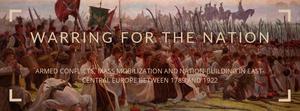Warring for the Nation
Armed Conflicts, Mass Mobilization and Nation-Building in East-Central Europe between 1789 and 1922
International Conference on the History of Nationalism
10-11 October 2022
University of Public Service
Budapest
Keynote speaker: AZAR GAT (Ezer Weitzman Professor at Tel Aviv University)
As recent examples in contemporary Europe clearly show, the role of armed conflicts in the state- and nation-building processes should not be underestimated in the contemporary era. This is even more evident when considering the history of Europe in the “long nineteenth century”: the massive interdependences between bellicism and nation have played a crucial role in the processes of collective identity-making since at least the French Revolution. In the early modern period, war was one of the major drivers of state formation in Europe.
However, whereas dynastic wars mainly involved the elites, implicating a rather limited role for the population, with the shaping of modern nations and nationalism, armed conflicts became increasingly “social” phenomena. In close interrelation with the tendency towards democratization and the broadening of political participation, wider and wider sections of society identified themselves with national ideas and the modern nation-state and accordingly could be mobilized to fight for causes and issues constructed in the increasingly nationalized political discourses.
Although the nineteenth-century in Europe was exceptionally peaceful compared to previous and subsequent periods, it had started with the French Revolution and the seriesof Napoleonic Wars and was terminated by the Great War, while the pan-European Revolutions of 1848–49 split it in two markedly different parts. Apart from the most important pan-European warring phases there were, nevertheless, several regional wars that proved to be crucial either immediately or in the long run for national movements and for emerging or even established nation-states alike, such as the Second Schleswig War, the Autro-Prussian and Franco-Prussian War, the Russo-Turkish War (1877-78) or the First and Second Balkan Wars. Finally, as is well known, the aftermath of the Great War brought a “golden age” of creating and restoring nation-states (along with self-styled ones) with the fall and the dismemberment of the great continental multi-ethnic empires in Europe.
The conference deals with aspects of the complex interconnectedness between (inter- and intrastate) armed conflicts and modern nationalism and nation-state building processes in Eastern and Central Europe (including the German-speaking territories, Austria-Hungary, the Balkans and European Russia) within the timeframe between 1789 and 1922.
Programme of the event
Registration for participants and students is still open.
